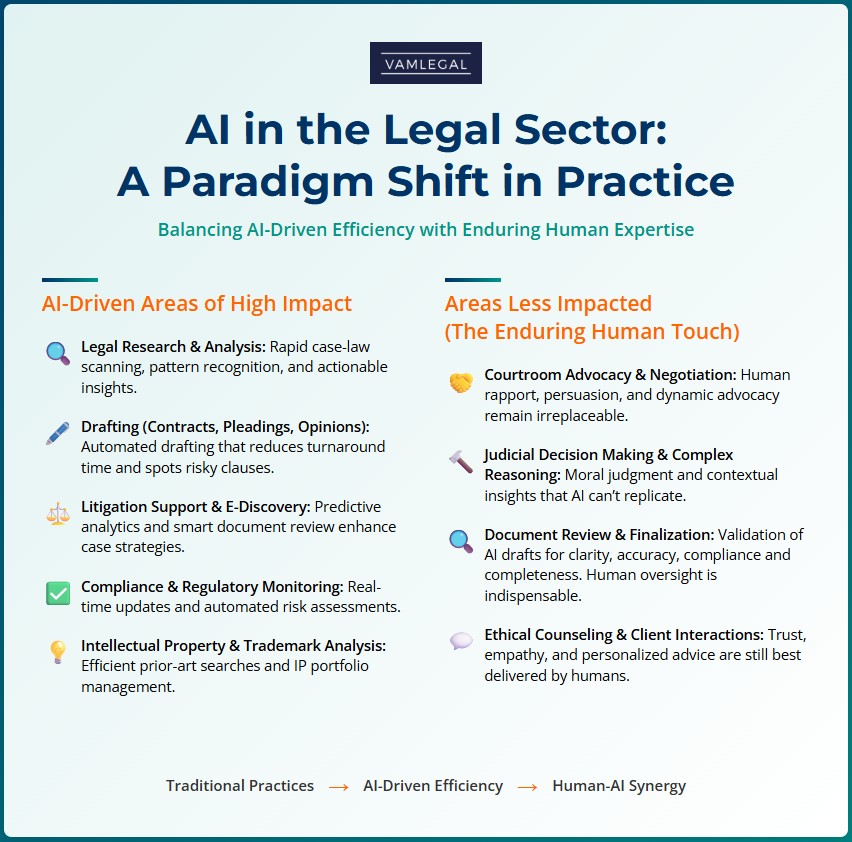
AI in the Legal Sector: A Paradigm Shift in Practice
Artificial intelligence (AI) is no longer a futuristic concept but a present-day reality rapidly reshaping industries worldwide, and the legal sector is no exception. While the legal profession has traditionally been seen as a bastion of human intellect and intricate judgment, AI is steadily weaving itself into its fabric, bringing both significant opportunities and considerable challenges.
While AI offers significant efficiencies and insights, its impact varies across legal functions. This article explores high-impact areas, regions of relative resistance, implications for legal jobs, and sets out the future course for legal professionals navigating this evolving landscape.
High-Impact Areas: Where AI Is Driving Transformation
AI’s most profound impact is felt in areas characterized by high volumes of data, repetitive tasks, and the need for efficiency. These include:
1. Legal Research and Due Diligence
AI-powered platforms (based on NLP engines and ML algorithms) can sift through vast databases of case law, statutes, regulations, and legal documents in mere seconds, far outpacing human capabilities and dramatically accelerating legal research. They can identify relevant precedents, extract key clauses, and even flag potential risks, dramatically speeding up research and enhancing accuracy in due diligence processes for mergers, acquisitions, and litigation.
2. Contract Review and Management
From drafting standard agreements to analyzing complex contracts for compliance or risk assessment, AI tools are revolutionizing contract lifecycle management (CLM). They can automate clause identification, highlight deviations from standard language, and suggest improvements, significantly reducing time and human error.
3. Document Automation
The creation of routine legal documents like wills, deeds, pleadings, and initial draft of contracts can be largely automated by AI, improving efficiency and consistency while freeing up legal professionals for more complex tasks.
4. Predictive Analytics and Outcome Forecasting
By analyzing historical case data and trends, AI algorithms can offer insights into potential litigation outcomes, helping lawyers make more informed strategic decisions, manage client expectations, and assess the risks of pursuing certain legal avenues.
5. E-Discovery
In litigation, AI excels at processing and organizing massive volumes of electronic data, identifying relevant evidence, and streamlining what was once a time-consuming and costly manual review process. Predictive coding and technology-assisted review (TAR) have become standard in handling large-scale litigation and regulatory inquiries.
6. Compliance and Risk Management:
AI can monitor regulatory changes, identify compliance gaps, and proactively manage risks by analyzing internal and external data, crucial in an increasingly complex regulatory landscape.
7. Client Onboarding and Basic Inquiries:
AI-powered chatbots and virtual assistants are increasingly used to handle initial client inquiries, provide basic legal information, and streamline the onboarding process, improving client accessibility and response times.
Lower-Impact Areas: Where Human Expertise Still Reigns
While AI is transforming many aspects, certain core legal functions remain largely the domain of human expertise due to their reliance on nuanced judgment, emotional intelligence, and complex human interaction:
1. Courtroom Advocacy
Despite AI’s growth, the nuanced tasks of courtroom advocacy, negotiation, and personalized client advice remain largely human-centric. Emotional intelligence, persuasion, and strategic thinking are not easily replicated by machines. The art of crafting compelling arguments, cross-examining witnesses, adapting strategies in real-time based on human reactions, and persuasive oral advocacy still requires human intuition, empathy, and strategic thinking that AI cannot replicate. AI can support but not replace seasoned legal minds.
2. Client Counseling and Relationship Building
Deep client relationships, understanding their emotional needs, providing empathetic advice, and navigating sensitive personal or business situations are inherently human tasks that AI cannot fully replicate.
3. Legal Strategy and Interpretation
Crafting legal arguments, interpreting ambiguous statutes, and exercising ethical judgment are deeply contextual and often require human insight. These areas are less amenable to automation.
4. Negotiation and Mediation
Effective negotiation and mediation depend on understanding human psychology, building rapport, adapting to shifting dynamics, and finding creative solutions, all of which are beyond AI’s current capabilities.
5. Developing Novel Legal Strategies
While AI can assist with research and prediction, conceiving truly innovative and groundbreaking legal strategies that challenge existing norms or navigate uncharted legal territory still requires human creativity and foresight.
6. Ethical Decision-Making
AI can identify ethical dilemmas, but the ultimate responsibility for ethical judgments and upholding the principles of justice rests squarely on human lawyers.
7. Interpreting Ambiguous Laws and Precedents
While AI can analyze vast datasets, the nuanced interpretation of highly ambiguous legal texts, especially in novel situations or evolving areas of law, often requires human deliberation and judgment.
Impact on Legal Jobs: Shifting Skills, Not Just Roles
The integration of AI into the legal sector is likely to lead to an evolution of job roles rather than mass displacement. Routine, repetitive, and administrative tasks that traditionally occupied the time of junior lawyers and paralegals are most susceptible to automation. The evolution of newer roles and changing responsibilities will be more prevalent in the corporate law firms than the traditional litigation practice-oriented firms. This might include:
- Routine Tasks Are Being Automated: Junior associates and paralegals, traditionally responsible for time-consuming tasks like drafting, document review and due diligence, are most affected. Automation may reduce the number of these entry-level roles or change their focus.
- Paralegals and Legal Assistants: Their roles may shift from manual document review and data entry to supervising AI tools, verifying AI outputs, and focusing on more complex administrative and client-facing tasks.
- Junior Lawyers: The initial years of sifting through documents and performing basic research may be significantly reduced. This means junior lawyers will need to develop higher-level analytical, strategic, and client management skills earlier in their careers.
- Reviewer Role will be elevated: Reviewers or Mid-level lawyers will hold the key responsibility of validation of AI output (Quality control) covering various activities – litigation document review or due-diligence activities be it the review of initial drafts of contracts, pleadings or policies etc. The traditional role of reviewer will transform to more strategic, analytical and critical application after adoption of AI. AI will do the heavy lifting traversing through loads of documents, but the human reviewer will remain indispensable for:
- Providing critical human judgement required to interpret documents within the legal and factual context resulting in final judgment and ethical decision-making.
- Interpreting nuances and context. Translating AI output to actionable insights.
- Risk Assessment – Assessing the legal risks associated with identified documents or clauses, beyond what AI can simply flag based on predefined rules.
- Strategic insights that AI cannot provide.
- Ensuring the integrity and accuracy of the AI-driven process – Bias detection, Confidentiality and Data Security.
- Training & mentoring junior lawyers
This evolution demands legal professionals who are not only legally astute but also technologically proficient, adaptable, and forward-thinking.
- New Roles Are Emerging: Legal technologists, AI compliance officers, and data privacy specialists are growing fields in the corporate sector. These hybrid roles blend legal expertise with tech fluency.
- Legal Data Scientists: Professionals who can analyze legal data to train and refine AI models.
- Legal Prompt Engineers: Specialists in crafting effective queries for AI tools to extract precise legal information.
- Legal Technology Specialists: Experts in implementing, managing, and troubleshooting AI solutions within law firms.
- Legal Process Engineers: Professionals who can optimize legal workflows by integrating AI tools.
- Upskilling Is Essential: Lawyers who adapt by learning how to leverage AI tools will remain indispensable. Skills in data analysis, understanding technical architecture, and understanding AI ethics are becoming valuable complements to traditional legal knowledge.
Future course for the Legal Fraternity: Embrace, Adapt, and Lead
The legal fraternity must embrace this technological shift to thrive in the AI-powered future:
1. Stay Informed and Invest in Learning
Lawyers and firms must invest in understanding how AI works, its capabilities, and its limitations. Regular training, attending tech-oriented legal seminars, and cross-disciplinary education can help.
2. Become AI-Savvy Users:
Learn to effectively utilize AI tools for research, document review, and automation. Proficiency in “prompt engineering” – the art of crafting effective queries for AI – will be a crucial skill.
3. Focus on High-Value Human Tasks
Sharpen skills that AI cannot replicate such as critical thinking, complex problem-solving, strategic planning, emotional intelligence, negotiation, client communication, and creative advocacy. These will remain the hallmarks of great lawyers.
4. Collaborate with Technologists
Bridge the gap between legal expertise and technological know-how by collaborating with data scientists, AI developers, and legal tech companies.
5. Prioritize Ethics and Responsibility
Understand the ethical implications of AI, including potential biases in algorithms and data privacy concerns. Develop robust internal policies for responsible AI use and ensure human oversight remains paramount.
6. Foster a Culture of Innovation
Law firms and legal departments should invest in AI technologies, conduct pilot projects, and encourage their teams to experiment with and integrate AI into their daily workflows.
7. Re-evaluate Business Models
The billable hour model may need to adapt as AI drives efficiency. Firms might explore alternative fee arrangements that reflect the value added by AI-powered services.
Conclusion
As is said about Science, AI will be a good servant but a bad master. AI is a powerful ally for the legal industry, offering speed, efficiency, and insight. But it is not a wholesale replacement for human judgment. With its limitations, AI cannot match the human legal acumen which considers various factors before making a sound decision that includes the contextual and situational understanding, correct interpretation as per the objective, consideration of aggravating or mitigating factors and associated risks, understanding of human behavior and psychology and ethical considerations.
Instead, it is reshaping roles and demanding new competencies. AI is not just a tool; it’s a paradigm shift. For the legal fraternity, proactive adaptation, continuous learning, and a focus on uniquely human skills will be key to navigating this evolving landscape and ensuring a future where technology enhances, rather than diminishes, the pursuit of justice.
